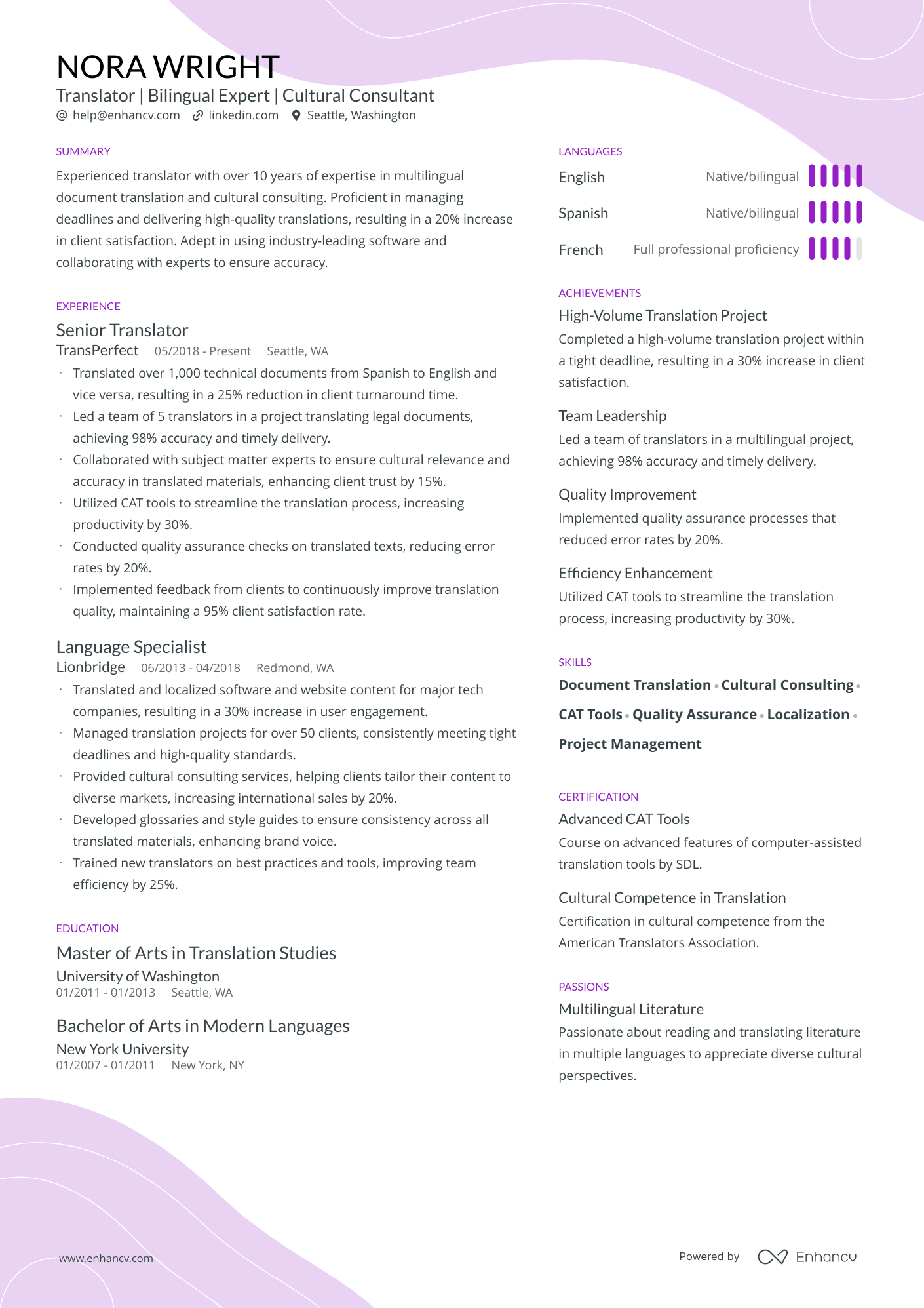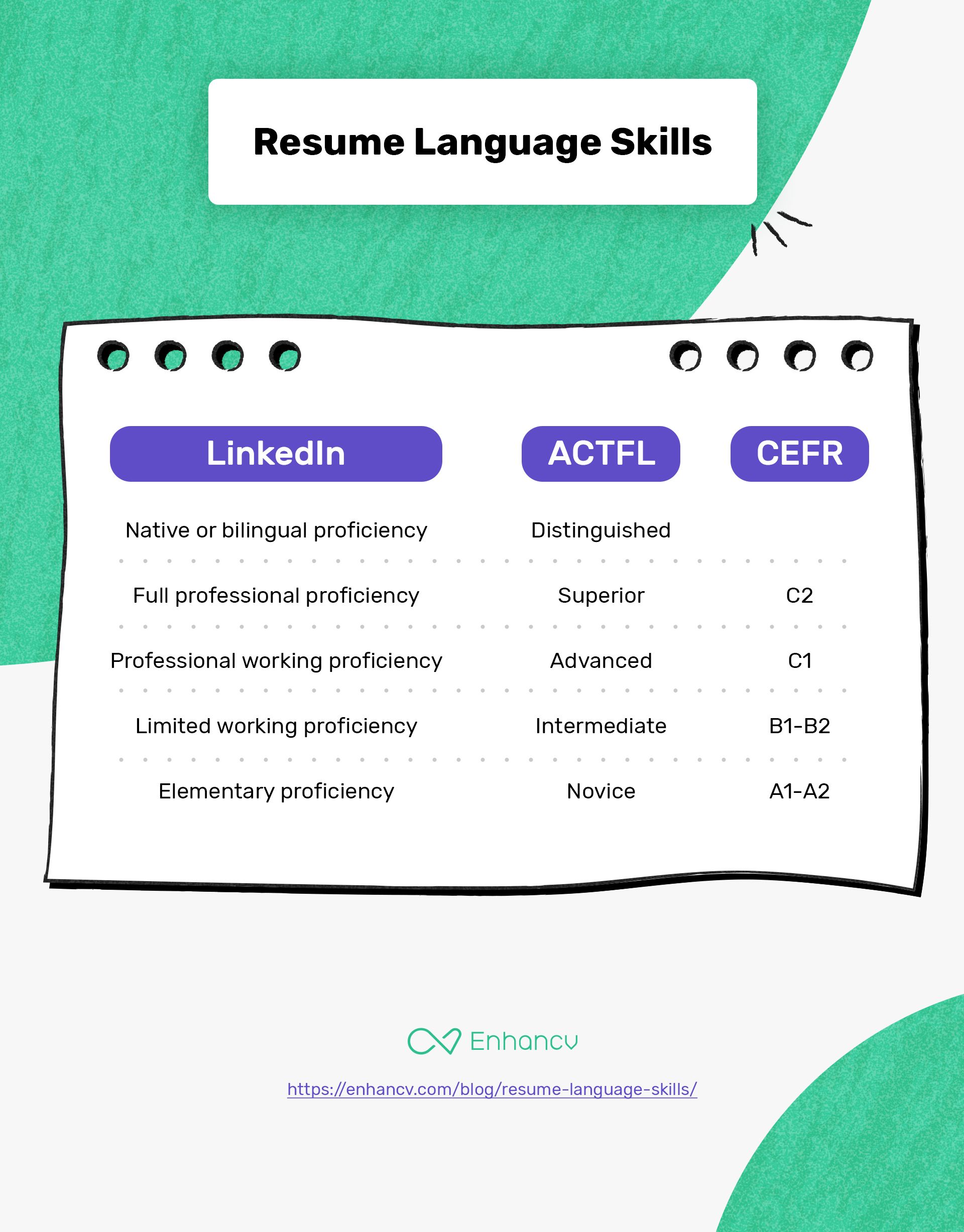Did you know that the languages you speak can affect your personality? Indeed, they can change the way you express your emotions, your intonation, your facial expressions and gestures. How lucky are we to be able to take on different roles – we do this when we change jobs, and when we speak another language. Sometimes, we can do both simultaneously!
Your language skills are effective in all walks of life, and your career is no exception. In our interconnected world, being multilingual is highly valued by recruiters. Wondering how to list your language proficiency on your resume? Our guide covers that and more!
Key takeaways:
- The core language skills are speaking, listening, reading, and writing. Each is uniquely useful, so practice them all when you can.
- Listing your language skills is always a good idea, especially in jobs where you’ll work with multinational clients. Language proficiency can help you in different settings, as learning them practices valuable skills such as self-discipline, creativity, and cultural awareness.
- Your language skills are best placed in a separate section, but interspersing them in your summary, experience, education, and skills section is also an option.
- A good language section is concise but catchy, so consider using an interesting design to present your fluency.
- Your language level is probably the most important information to recruiters. Remember to be consistent with the framework you use.
- If you’re based in the US, choose between the IRL or ACTFL frameworks. The CERF scale is best if you’re in Europe. The LinkedIn scale is universal.
What are language skills?
Your language skills can range from holding a casual conversation to writing your PhD in a certain language. So, what people consider a language ability can vary widely depending on their needs.
Generally, language skills are what allows you to communicate effectively with people from different nationalities and cultures. These abilities are typically divided into four main categories: listening, speaking, reading, and writing. Each of these is important for a unique reason:
- Listening: This skill enables you to understand your favorite songs in Spanish, catch snippets of conversations in Italian cities, and meet client needs effectively in work meetings through accurate comprehension and response.
- Speaking: Essential for engagement, speaking allows you to interact actively and effectively in a new language, whether leading presentations, negotiating, or collaborating in diverse work environments. Focus on clarity over perfect pronunciation.
- Reading: Reading in various languages opens up access to exclusive, industry-specific information, providing a competitive edge by allowing you to absorb insights unavailable in your native language.
- Writing: Beyond correct grammar and spelling, writing in another language lets you clearly and logically express ideas, making an impact in professional settings through well-crafted emails, reports, and proposals.
When should I include language skills on my resume
It’s always worth mentioning your language proficiencies on your resume, as they can help in diverse situations. Even if the job posting doesn’t specifically call for them, language skills can set you apart in a competitive environment.
Language learning is valuable: it develops cognitive skills like memory and problem-solving, enhances communication abilities, fosters social and cultural awareness, and cultivates practical skills like time management and digital literacy.
Here are some concrete examples of when your language skills could be beneficial in your application.
If speaking a foreign language is valuable to the company
That’s pretty straightforward — if your language skills are relevant to the job you’re hoping to get, you should include them.
Think about what your day-to-day tasks will be in your role. If you’re a translator or a language teacher, your job will naturally revolve around languages. But what about other jobs, where language skills might not seem as crucial? If you’re applying for a retail assistant, will multiple languages help you communicate with customers? If you’re working in customer support, how many countries is the company based in? Reflect on how your language abilities can add value, even in roles where they aren’t an obvious requirement.
Here’s a resume language skills example Sia built with Enhancv. It uses one of the most popular frameworks, the ACTFL Proficiency Scale (we’ll talk about it in a bit).
If you have little experience
If you’re putting together your first resume, language skills show your ability to learn quickly and to apply your knowledge to real-world situations. Especially if you’ve chosen the functional format that gives more weight to your skills rather than your limited experience.
In Avery’s volunteer resume, they highlighted their language skills as they were applying for a role with AIESEC, which has entities based all around the world.
This resume language section example uses the LinkedIn language framework (we’ll talk about this one in a bit, too).
If the open position is competitive
In a competitive environment, listing your language skills can make you a more well-rounded candidate. Imagine the following scenario:
Both Tom and Emma are applying for the position of Senior Marketing Manager at Etsy. They’ve got the same amount of experience, and their skill set is fairly similar, too. However, Emma mentioned that she’s fluent in French & German on her resume, while Tom didn’t.
Emma's language fluency makes her stand out for the Senior Marketing Manager role at Etsy, proving how crucial it is to highlight all relevant skills on a resume.
If you're applying for a job in a different country
Reassure the hiring manager that there’d be no language barrier when communicating with your coworkers. Think of ways to express cultural familiarity and language use in professional settings. If you speak French, for example, you can list things like:
- Conducted market research and wrote detailed reports in French for a French-speaking region.
- Coordinated with French suppliers, ensuring seamless project execution.
- Spent six months in France on a work exchange, immersing in French business practices and culture.
If you’re going to work in a language that’s not your mother tongue, make sure you can provide evidence of your abilities. This will give you credibility. What courses and certificates can you list to show you’ve worked at learning the language?
If you have to demonstrate quick-learning skills
If you’re applying for a job involving lots of continuous learning, your language-learning experience can come to your advantage. Here’s how you can mention this in your cover letter or during the interview:
- Learning a new language required me to quickly adapt to different methods and environments, showcasing my flexibility.
- Overcoming language learning challenges enhanced my problem-solving abilities.
- Balancing language study with other tasks strengthened my self-discipline and time management.
Should I put English as a language on my resume?
The recruiter will assume you’re proficient in the language your resume is written in. So, if you’re living and working in the US, and your resume’s written in English, there’s no need to specifically underline that skill. It’s a given.
Where should I include language skills?
When adding language skills to your resume, you have two effective strategies to choose from depending on your career goals and the job requirements.
Include languages in a dedicated section
To make your language skills highly visible, create a specific section titled "Languages." Here, list all languages you are familiar with and your fluency levels. Using a resume builder can be particularly useful as it lets you customize this section to be as concise and clear as possible. This format is especially beneficial if language skills are critical for the job you're applying for.
Include languages throughout your resume
Alternatively, you can weave your language skills into various parts of your resume. This approach is suitable for jobs where language proficiency is beneficial but not a primary requirement. It allows you to save space while still highlighting your abilities. For instance:
- In the experience section: Mention language use in your job duties, like "Conducted bilingual training sessions for a diverse team."
- In the education section: Highlight language-related degrees or coursework, such as a degree in French Literature.
Got a resume already? See how good it is with our free ATS resume checker!
Is your resume good enough?
Drop your resume here or choose a file. PDF & DOCX only. Max 2MB file size.
How to write a good language skills section?
If you’ve opted for a separate language section, make it concise but informative. You just need the language and the level of fluency. If you want to creatively visualize your proficiency, the Enhancv resume builder has five different styles you can use to present your language skills.
When crafting this section, follow these tips:
- Start with the ones you’re most proficient in. Skip languages you only know at beginner/elementary level. These can add color to your resume, but they’re not really helpful in a work setting.
- Detail contexts where your language skills came in handy, like "Used in international conferences" or "Daily communication with overseas clients."
- Be honest about your proficiency. Overstating your skills can lead to uncomfortable situations in professional settings.
- Use widely recognized proficiency levels like "Native," "Intermediate," "Professional Working Proficiency," and "Limited Working Proficiency."
Language proficiency levels
Marking the level of fluency in a language is similar to quantifying your achievements in different resume headings. The recruiter needs a tangible way of judging your ability. Let’s review the most popular frameworks.
LinkedIn Framework
LinkedIn’s scale is based on and is very similar to, the IRL (Interagency Language Round-table) scale, developed by the U.S. Foreign Service Institute. It measures language proficiency in terms of work settings, so its levels are, as follows:
- Native or bilingual proficiency
- Full professional proficiency
- Professional working proficiency
- Limited working proficiency
- Elementary proficiency
Take a look at this sample language proficiency section:
The IRL scale is mainly used when applying for US government jobs. Its levels (from 0 – 5, where 5 is Native) correspond to the levels on LinkedIn.
ACTFL Proficiency Framework
This scale assesses the ability to use language to accomplish communication objectives in real-world situations, with specific criteria for accuracy, context and content, and text type. Here are the levels it works with:
- Distinguished
- Superior
- Advanced
- Intermediate
- Novice
These scales are widely recognized by recruiters in the US, so choose the one you feel more comfortable with. But what if you’re based outside the States? Then, we recommend this scale:
Common European Framework of Reference for Languages (CEFR)
CEFR is an internationally recognized standard for describing language ability. It outlines what learners can do in speaking, reading, listening, and writing at each level. It’s widely recognized across Europe but currently gaining popularity in other countries as well. So if you’re listing languages on your CV, here’s an overview of its levels:
- C2 (Proficiency)
- C1 (Advanced)
- B2 (Upper Intermediate)
- B1 (Intermediate)
- A2 (Elementary)
- A1 (Beginner)
Again, just remember that if you’re coming from Europe but are applying for a job in the US, you should use the LinkedIn/IRL or the ACTFL framework.
And here’s a quick recap of what each level represents. Note that the CERF doesn’t measure native proficiency, as it’s mainly designed for learners of foreign languages.
- Native or bilingual proficiency/Distinguished: You’ve grown up speaking the language, using it throughout your life, and refining your abilities through formal education.
- Full professional proficiency/Superior/C2: You can read, write, and speak a language smoothly and without hesitation.
- Professional working proficiency/Advanced/C1: You can speak, write, and read a language comfortably for your role, though you might struggle with colloquialisms and occasionally need repetition.
- Limited working proficiency/Intermediate/B1-B2: Intermediate language skill means you can hold conversations and read adequately in the language, but you speak with some difficulty and have a limited vocabulary.
- Elementary proficiency/Novice/A1-A2: You can understand basic words or phrases but can’t hold a conversation. We recommend you don’t list this one on your resume.
Mistakes to avoid when including your language skills
Lying
What’s essential in listing your language skills is being fair about your fluency level. You don’t want to list an intermediate language level if you can only ask for coffee or say a few phrases.
If you list your skills as advanced or above, be prepared to answer a few questions or hold a conversation in that specific language. You never know – perhaps the recruiter will be fluent and in the mood for a little bit of practice!
Forgetting to update LinkedIn
If you’re discussing your language skills on your resume, be sure your LinkedIn profile is up-to-date, too.
One advantage of updating your language skills on LinkedIn is you can have colleagues provide recommendations and references of your ability in this skill.
Forgetting to include your mother tongue
Add your native language, alongside the foreign languages you know. Otherwise, you’ll confuse recruiters, especially if you’re applying for a job abroad.
Don't mix and match different language frameworks
Consistency is important. Don’t list one of your language levels as “Professional working proficiency”, and the other as “Intermediate.”
Use the most relevant language framework
If you’re based in the US, choose the LinkedIn, IRL, or ACTFL scale. In Europe, go with the CERF levels.
FAQs about language skills on resume
How to demonstrate language skills?
You can show your fluency on your resume with examples of how you’ve used the languages you’re proficient in. This could be a portfolio of work samples in different languages, or any certificates, awards, and diplomas. For cover letters, real-life examples are your best bet.
What does it mean to be proficient in a language?
Proficiency is the ability to comprehend and accurately produce content in a certain language. It is highly valued in jobs that require language precision, such as an academic setting.
What does it mean to be intermediate in a language?
Being intermediate in a language means you can handle everyday conversations, express thoughts on familiar topics, and understand the main points of clear standard speech or writing. This level typically allows for independent travel and casual social interactions without full fluency.
What’s the difference between proficient vs. fluent?
Fluency refers to the flow of your speech, the ability to speak comfortably and consistently, while proficiency relates mainly to reading and writing.
One is not necessarily better than the other, because they refer to different things. We recommend using “proficient” on your resume, as it’s the word recognized by the most popular frameworks.
How to check language proficiency?
You can look up local language centers – most test your language skills for free if you’re interested in enrolling in a course. Some even have language proficiency checkers online!
Can you have two native languages on a resume?
Yes, of course! Being bilingual will definitely impress recruiters. You can list all the languages you speak natively.
How to list programming languages?
When detailing your skills on a resume, include a dedicated "Skills" section for programming languages such as Python, Java, and C++. Demonstrating proficiency in these languages shows your ability to write, test, and maintain code across various applications. Enhance your listing with examples of past projects or work experience, such as a GitHub portfolio.
What is the most important language skill?
Ask yourself, what do you need the language for? To read documents or to have conversations? Are you going to communicate orally with clients? Do you know the etiquette and turns of phrase to talk to your coworkers in their native language? Understanding your specific needs and context will help determine which is the most crucial language skill for you to focus on.
In conclusion
Your multilanguage magic can open doors with every word you know! We hope the tips in our guide will help you proudly list your language skills on your resume. It’s inspiring to think about the myriad of cool things you can do with another language in your arsenal.
Make one that's truly you.






